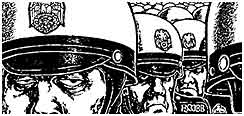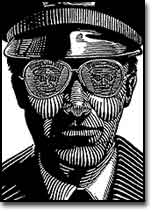
|
|
 |
Other Law Enforcement Issues |
|
|
|
|
|
Reining in
the Cops (This article is edited from a speech delivered on October 21, 2000 in San Francisco, California at an event called "How to Radically Transform Policing: An Intimate Dialogue." The event, sponsored by Prison Radio, featured Tanya Brannan of the Purple Berets, and Ron Hampton of the National Black Police Association.) I've been an activist for more than twenty years, working in an array of revolutionary and social justice movements. If there's one thread that has run through all of that work, it is holding government accountable for its atrocities, whether those atrocities are committed against union organizers by Salvadoran death squads, against environmental activists by the FBI, or against domestic violence victims by the Sonoma County Sheriff. In 1991, I helped to start the Purple Berets, a radical women's rights group. We very quickly got drawn into a local rape case — the David Noles case. Noles was a Petaluma chiropractor who had virtually bought Marķa, a Mexican immigrant woman, then locked her away and raped her repeatedly until she was able to make her escape. Since then we've worked hundreds of such cases, advocating for women and becoming experts on how the criminal justice system — from the responding officer to the sentencing judge — responds to crimes of violence against women. And I'm here to tell you that if you and I, as leftists/progressives/revolutionaries, if we intend to tackle the complex issue of policing -- the role of police in our communities and our need and our right to control their behavior — if we're not looking at how police handle violence against women, we're only looking at part of the problem. Violence
Against Women Yet every day women in our neighborhoods — our sisters, our daughters, our classmates, our comrades — are beaten, kicked, spit at, threatened with death or the death of their children or other loved ones, thrown from moving cars, raped, sodomized, urinated on, shot, stabbed, their every move surveilled, cut off from family and friends, not allowed to work, drive or talk on the phone, threatened with deportation or loss of custody of their children, run down in cars, or murdered and literally thrown in garbage dumpsters. These aren't exaggerations — these are all women I have worked with, gone to court with, gone to their funerals. Between one-half and one-third of all calls to police are domestic violence calls. And every day law enforcement turns its back on these women — fails to make an arrest or even write a police report, fails to prosecute the perpetrators, threatens and bullies the victims. Many women tell us the responding officer threatens, and often carries through on that threat, to arrest the victim if she insists on pursuing justice. Marķa Teresa Macias, Mina Arevalo, Heather Moore, Melissa Tarantino, Nancy Lynch, Gina Barnett, Liz Toleson and her daughter Lisa, Carol Madeira, Loretta Whalen, Patricia Gustafson, Brenda Martini, Patrice Dodson, Jewelle Emerald Weatherspoon, Paulette Moore — for all of these women, that law enforcement failure was fatal. Yet both the local and national police accountability movements ignore these cases completely. Other than the Purple Berets and a handful of other violence against women organizations, no one marches or holds press conferences, no one demands justice, no one calls for national civil rights hearings. In fact most progressives, justifiably outraged at brutal cops and the racist and classist prison-industrial complex, think it scandalous that we would encourage women to bring police into their neighborhoods, even to save their own lives or the lives of their children. Two Sides
of the Same Coin So it's not as simplistic as "Stop police violence!" or even, "Let's just get rid of cops." The question is, how do we get at the kinds of structural changes that will do away with both the racism and brutality and the refusal to provide law enforcement to women? No doubt about it, there are no miracle cures. We're talking revolution here, not reform. It will take a full-on assault on policing as we know it, completely overhauling not just recruitment, hiring, and promotion, but also the internal investigations procedure and training from top to bottom, completely rethinking the idea of police work as a "career path." And it will mean firing a huge number of cops — cops who are brutal, cops who sexually harass female officers, cops who fail to enforce crimes of violence against women and children — and the ranking officers who have condoned such misconduct. These changes will only come as a result of intelligent, strategic, and relentless community organizing. And one thing's for sure: we'll never be able to bring forth that type of community pressure for change if we continue to ignore half the problem, and thus half of our natural allies. (To contact the Purple Berets call 707.887.0262, or click here.) |
|
©
Tanya Brannan, Purple Berets
|
|
You
can copy and distribute this information at will
if you include credit and don't edit. |
|
|
|
Copyright
© 2001 Purple Berets
|
|
|
|
Web
Site by S.
Henry Wild
|
 This
was a guy who'd done this before — to numerous immigrant
women over many years — and had always gotten away with it.
But this time, only because women refused to let it happen again,
the doctor went down. We were in court every time he was, we brought
press attention to the case, we pressured the DA to prosecute.
Because of that, David Noles is currently doing 38 years in prison.
I'm proud of that. Who knows how many women would have been victimized
over the next 38 years otherwise?
This
was a guy who'd done this before — to numerous immigrant
women over many years — and had always gotten away with it.
But this time, only because women refused to let it happen again,
the doctor went down. We were in court every time he was, we brought
press attention to the case, we pressured the DA to prosecute.
Because of that, David Noles is currently doing 38 years in prison.
I'm proud of that. Who knows how many women would have been victimized
over the next 38 years otherwise?